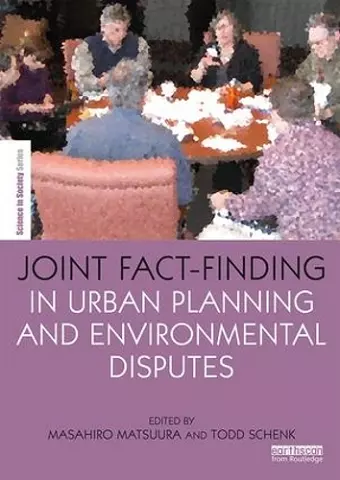Joint Fact-Finding in Urban Planning and Environmental Disputes
Masahiro Matsuura editor Todd Schenk editor
Format:Paperback
Publisher:Taylor & Francis Ltd
Published:26th Sep '16
Currently unavailable, and unfortunately no date known when it will be back
This paperback is available in another edition too:
- Hardback£145.00(9781138120174)

The days of rationalist scientific management and deference to official data are behind us. The credibility of experts and the information they provide are regularly challenged; officials are routinely provided with conflicting sets of facts as they plan and make decisions; and decision makers and stakeholders alike are largely skeptical that technical information will adequately account for the various interests and concerns and lead to the right outcomes. They struggle to reconcile technical information with other forms of knowledge, and differing interests, priorities and perspectives. Issues like climate change are complicating matters even further, as scientists and technicians must increasingly acknowledge the uncertainty and potential fallibility of their findings, and highlight the dynamic nature of the systems they are explaining.
This book examines how groups looking to plan and make decisions in any number of areas can wade through the imperfect and often contradictory information they have to make fair, efficient, wise and well-informed choices. It introduces an emerging and very promising approach called joint fact-finding (JFF). Rather than each stakeholder group marshaling the set of facts that best advance their respective interests and perspectives while discrediting the contradictory facts others provide, groups are challenged to collaboratively generate shared sets of facts that all parties accept. This book introduces readers to the theory of JFF, the value it can provide, and how they can adopt this approach in practice. It brings together writings from leading practitioners and scholars from around the world that are at the forefront of the JFF approach to science intensive policymaking, urban planning, and environmental dispute resolution. The first set of chapters outlines the concept of JFF, and situates it within other bodies of theory and practice. The second set of case-based chapters elucidates how JFF is being applied in practice.
This book delivers a new perspective to scholars in the field of public policy, urban planning, environmental studies, and science and technology studies, as well as public officials, technical experts, policy consultants, and professional facilitators.
ISBN: 9781138120181
Dimensions: unknown
Weight: 340g
214 pages